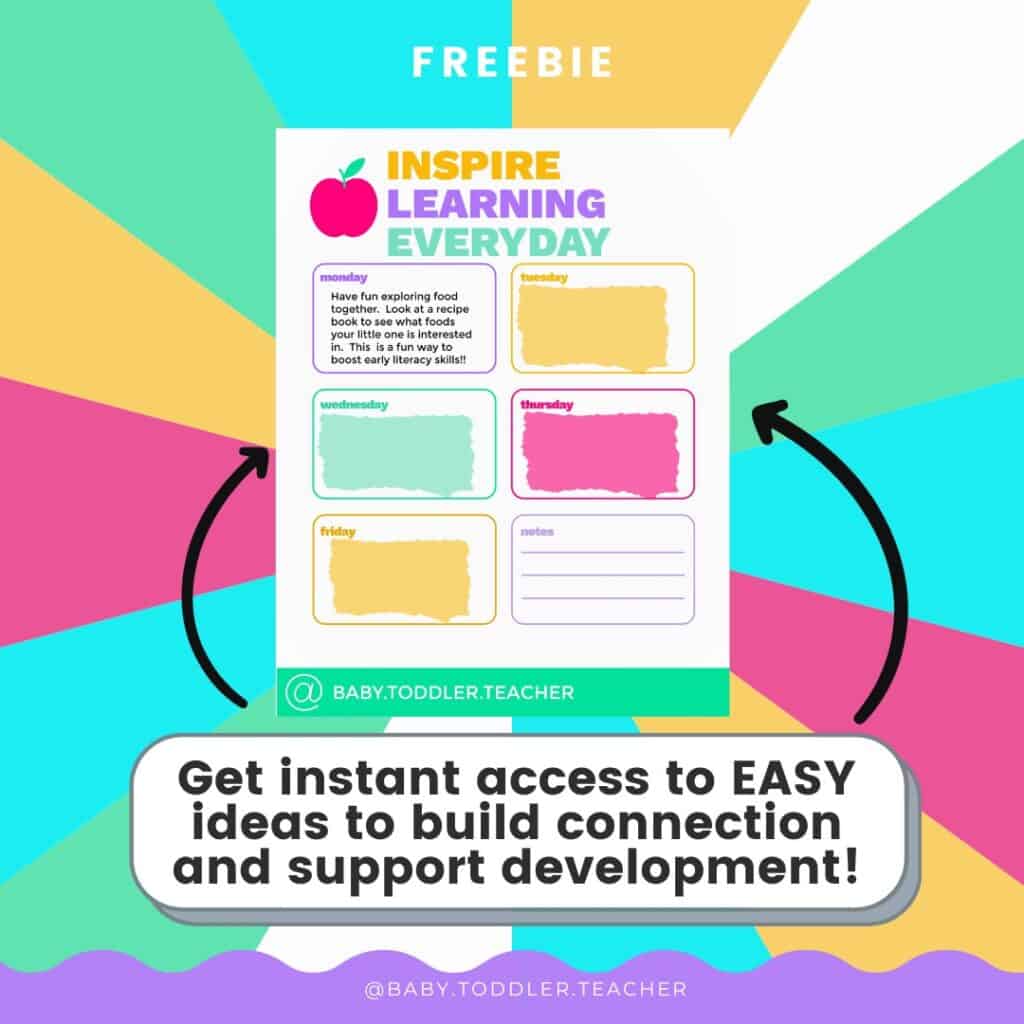Have fun with Your 5 Month Old Baby!
At the age of 5 months, your baby is starting to discover the world around them in more detail and it’s an exciting time for both parents and their little ones.
With each day, they’re learning and growing, making it the ideal time to introduce fun activities that can support your 5-month-old baby’s development.
This blog post aims to provide a guide filled with engaging activities that you can easily incorporate into your daily schedule.
These activities are not just for fun, they also support the enhancement of important skills like fine motor, gross motor, cognitive, and sensory skills.
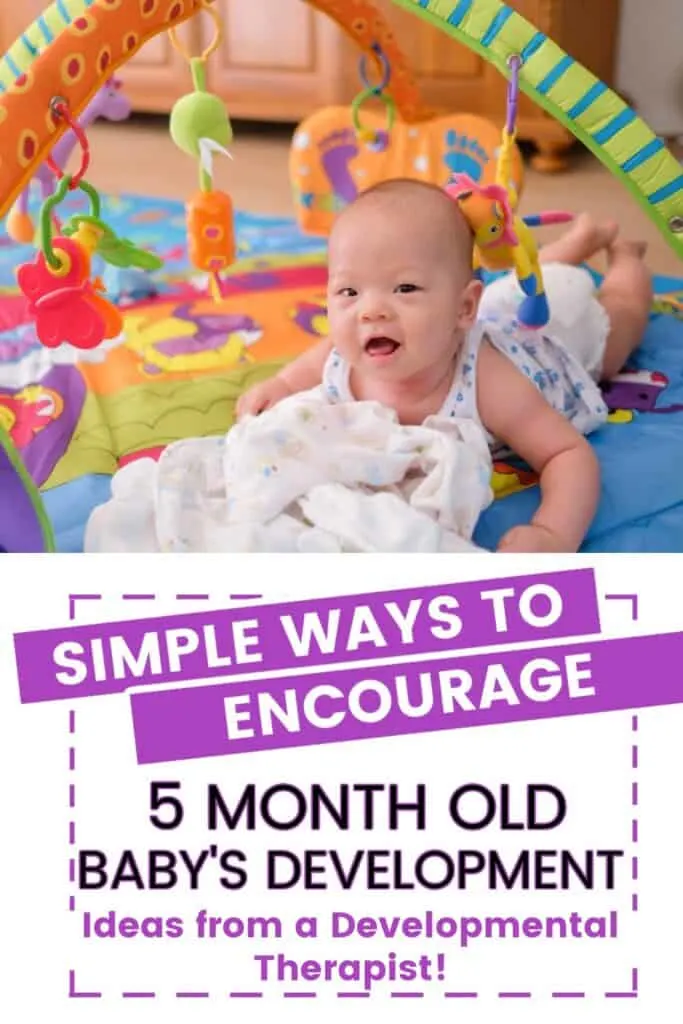
(This post may contain affiliate links. To read our full disclosure policy click here.)
What Skills Happen Around the 5-Month Mark?
At around five months, your baby’s development accelerates in numerous areas.
Cognitive skills are rapidly evolving during this period, as babies begin to understand cause and effect and display a growing interest in surrounding objects.
There’s a noticeable improvement in visual tracking as they start following moving objects with their eyes, showing signs of the hand-eye coordination that will be coming soon.
Their fine motor skills are also advancing significantly at this stage, with babies beginning to grasp objects voluntarily and explore them with both hands and mouth.
This is a critical milestone in their journey towards self-feeding and independent play.
Language skills are beginning to emerge, with babies responding more frequently to human voices, showing preference for certain sounds, and beginning to babble, laying the groundwork for future speech development.
Additionally, gross motor skills see a marked improvement.
You may notice your baby starting to roll over and demonstrating increased control over the head and body.
These developments provide a sturdy foundation for future skills, including crawling, standing, and walking.
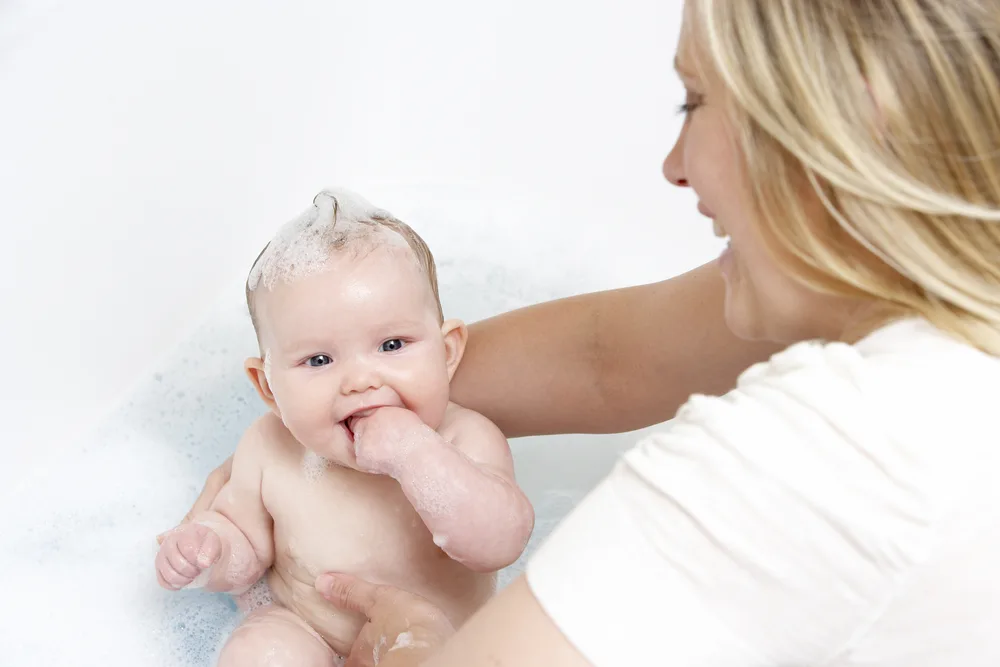
Learning Happens Through Daily Activities
Everyday routines offer abundant opportunities to interact and engage with your baby in a relaxed and comfortable setting, allowing for consistent, repetitive practice that is crucial for development.
Language development, for instance, can be enhanced during routine activities like feeding or changing diapers.
Instead of just going through the motions the next time you are changing your baby’s diaper try singing a song.
This makes the diaper change a little more tolerable for your little one and they can hear words over and over since singing has lots of repetition which is key when learning words.
Keep in mind your baby may not try to say or imitate words for quite some time, but hearing them is the first step to learning them!
Grab that laundry basket full of clothes and play with your baby while you get this task done.
Taking clothes out and playing the simple game of peek-a-boo is great for cognitive development and language skills.
Taking items of different texture and gently placing them in your baby’s hands is an easy sensory activity that also encourages fine motor skills.
Want more ideas on how to embed learning throughout your day?
I have it all laid out for you HERE.
Tummy Time is Still Important!
At five months old, tummy time continues to be a critical component of your baby’s daily activities, contributing greatly to their overall development.
Primarily, it aids in strengthening your baby’s core muscles, a foundational requirement for them to eventually maintain a sitting position on their own.
The practice of tummy time also fosters improved head control, a key milestone in your baby’s motor skill development.
Being on the floor is one of the safest and most beneficial places for your baby at this stage.
Floor play, with your baby positioned on their tummy, allows them to explore the world from a fresh perspective.
It also provides ample opportunities to develop and refine their motor skills in different ways.
Incorporate baby toys during this playtime to make the interaction more exciting and engaging.
Position toys in front of your baby during tummy time to encourage them to reach out and touch, consequently enhancing their hand-eye coordination.
Another simple yet effective strategy is to place your baby in front of a mirror.
This not only delights them but also fosters self-recognition and cognitive development.
Always watch your baby’s cues when it comes to tummy time.
Start out with short bursts throughout the day and allow them to stay on their tummy longer as it becomes more enjoyable.

Grab your FREE Milestone Guide HERE.
Playtime Activities to Encourage Learning
A significant amount of learning can take place in the cozy comfort of your living room, through playful engagement with your baby.
Encouraging playtime with developmentally appropriate toys can be an excellent tool to stimulate new skills.
For instance, consider the role of a soft toy (like this one) in promoting hand-eye coordination.
When a baby’s eyes follow the movement of the toy, and their tiny hands reach out to grasp it, they are strengthening this vital linkage between sight and motor skills.
Don’t underestimate the power of a fun game with your baby’s favorite toy.
It can foster not just joy and laughter, but also cognitive abilities like problem-solving skills.
For example, playing a simple game of ‘hide and seek’ with a toy can encourage your baby to understand object permanence, a key cognitive milestone.
Always remember to choose age-appropriate toys that match your baby’s current developmental stage.
Toys that are too advanced can be frustrating, while those that are too simple might not provide enough stimulation.
The right toys can turn playtime into a rich learning experience, paving the way for your baby’s all-round development.
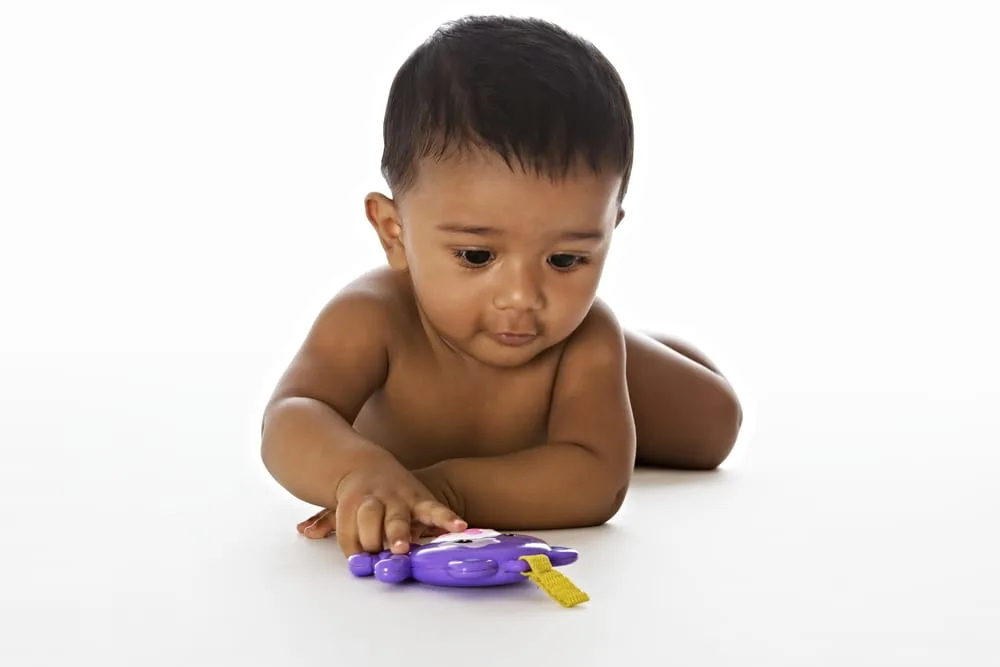
Recommended Toys for 5-Month-Old Babies
When it comes to baby toys choose ones that can be used multiple ways and require your baby to “do something” instead of the toy doing everything.
Keep in mind that loud and bright toys can be overstimulating to babies…and parents!
Here are some of the best options to consider:
Soft Rattles: These are excellent for enhancing your baby’s hand-eye coordination. The shape of the rattle encourages your baby to grasp it, while the sound it produces when shaken provides auditory stimulation, making it a multi-sensory toy. These are the ones we had.
Unbreakable Mirrors: Babies are naturally intrigued by their reflection, making unbreakable mirrors (like this one) an excellent addition to their playtime. As your baby reaches out to the “baby” in the mirror, they are developing their self-recognition skills, a crucial cognitive milestone.
Soft Books: Soft fabric books (this one is cute) with engaging colors and textures are perfect for stimulating your five-month-old’s developing vision and tactile senses. Interactive elements, such as flaps or squeakers, can also encourage curiosity and exploration.
Play Gyms: These activity centers (like this one) are packed with a variety of toys and stimuli for your baby. From dangling toys to kick-activated piano keys, play gyms provide a rich environment that encourages your baby to reach, roll, and kick, promoting physical development and refining motor skills.
Each of these toys, when used thoughtfully during playtime, contributes to your baby’s growth and learning, helping them reach those important developmental milestones.
The Importance of Unstructured Independent Playtime
Unstructured independent playtime is a vital aspect of your baby’s daily routine, providing an opportunity for them to explore, experiment, and learn at their own pace.
This type of play isn’t directed by adults, but rather is spontaneously initiated and directed by the child, fostering a sense of independence, creativity, and problem-solving.
By taking a step back and assuming the role of an observer, you allow your baby the freedom to make decisions, enhance their motor skills, and stimulate their cognitive development through natural curiosity.
However, it’s crucial to ensure your baby’s safety during this time.
Supervise their independent playtime to ensure they are in a safe environment, free from potential hazards.
Remember, your role is not to direct their play but to provide a secure environment where they can freely explore and enjoy the self-discovery that comes with independent play.
Reading with Your Baby
Reading with your baby is one of the best activities to engage in, serving as a powerful tool for bonding, communication, fine motor, and cognitive development.
It’s a good idea to start early, creating a habit that can last a lifetime. As your baby grows, they will begin to associate reading with feelings of closeness and comfort.
This, in turn, establishes a positive and nurturing environment that is conducive to learning.
In terms of communication, reading together helps babies become familiar with the rhythms and sounds of language, setting the foundation for their speaking abilities.
It’s also an opportunity to expose them to a wide range of vocabulary that they might not hear in everyday conversation.
Modeling for your baby how to pat the pictures is a great place to start when it comes to encouraging fine motor skills.
Offering books with interesting textures can also be motivating for young babies to touch and explore.
You can find some of my favorite books for babies here.
Cognitively, reading captures your baby’s attention, stimulating curiosity and imagination.
Most importantly, reading activates different regions of your baby’s brain, supporting the development of early literacy skills.
It guides them in making sense of the world around them while promoting critical thinking and problem-solving skills.
Undoubtedly, reading with your baby is a rewarding activity, offering benefits that extend well beyond the early years.
Enjoy the time with your baby!
In conclusion, engaging in seemingly simple activities with your baby can lay the foundation for their physical, cognitive, and language development.
While changing diapers or doing the laundry might seem ordinary, they can be transformed into opportunities for language acquisition and sensory play.
The time spent on the floor during tummy time, though it may seem tough for your baby initially, is a great time for strengthening core muscles and improving head control.
Playtime activities, particularly those involving age-appropriate toys, are among the best ways to stimulate vital skills such as hand-eye coordination and problem-solving.
Lastly, one of the most engaging activities you can share with your baby is reading.
This not only fosters a love for books early on, but also aids in the development of literacy skills, fine motor skills, and cognitive abilities.
Therefore, every interaction you have with your baby can be a stepping stone to their overall development, turning mundane moments into milestones.
Frequently Asked Questions
A 5-month-old baby is just starting to explore the world and develop new skills. Some entertaining activities you can do with your baby at this age include tummy time, floor play with toys, reading together, and sensory play (e.g., playing with different textures). Always remember to choose developmentally appropriate activities for your baby. Keep in mind that you do not have to entertain your baby 24/7. Allowing them to play indpendantly don’t the floor while you supervise them can be a great option as well.
No, it is not necessary to entertain your baby all day. In fact, allowing them some independent playtime and giving them space to explore on their own can be beneficial for their development. It’s important to balance structured playtime with unstructured moments where your baby can learn and discover on their own. Always prioritize safety and supervision during these times.
Related Posts You Will Enjoy
The Best Outdoor Activities for Babies
The Best Baby Floor Mats for Crawling
Easy Social Emotional Activities for Infants
How to Find a Baby Sitter You Can Trust
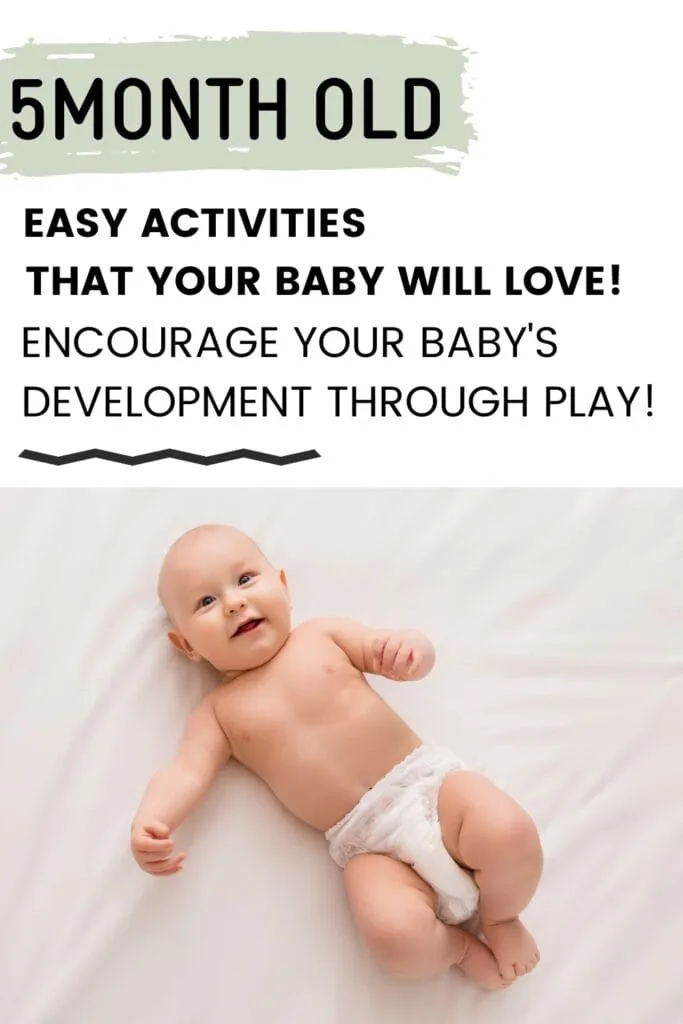

Kayla O’Neill has a master’s degree in education as well as a bachelor’s degree in special education with an emphasis in early childhood education. She has been working as a developmental therapist with babies and toddlers in early intervention since 2012. She is also a mom with two young children.
